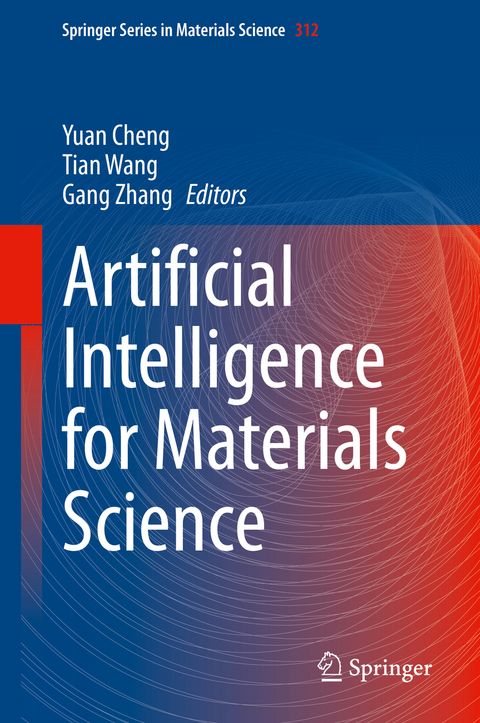
Artificial Intelligence for Materials Science
Springer International Publishing (Verlag)
978-3-030-68309-2 (ISBN)
Machine learning methods have lowered the cost of exploring new structures of unknown compounds, and can be used to predict reasonable expectations and subsequently validated by experimental results. As new insights and several elaborative tools have been developed for materials science and engineering in recent years, it is an appropriate time to present a book covering recent progress in this field.
Searchable and interactive databases can promote research on emerging materials. Recently, databases containing a large number of high-quality materials properties for new advanced materials discovery have been developed. These approaches are set to make a significant impact on human life and, with numerous commercial developments emerging, will become a major academic topic in the coming years.
This authoritative and comprehensive book will be of interest to both existing researchers in this field as well as others in the materials science community who wish to take advantage of these powerful techniques. The book offers a global spread of authors, from USA, Canada, UK, Japan, France, Russia, China and Singapore, who are all world recognized experts in their separate areas. With content relevant to both academic and commercial points of view, and offering an accessible overview of recent progress and potential future directions, the book will interest graduate students, postgraduate researchers, and consultants and industrial engineers.
lt;b>Dr. Yuan Cheng. Before join in Monash Suzhou Research Institute, Dr Yuan Cheng is a Senior Scientist and Group Manager at the Institute of High Performance Computing (IHPC) in Singapore. She graduated from Fudan University, China with a Bachelor degree and got her Ph. D degree from National University of Singapore. Upon completion of her Ph.D. degree, she joined the Institute of High Performance Computing (IHPC) in Singapore. During Feb. till Jun. 2009 she visited Brown University, USA as a visiting scholar. Dr Cheng's expertise involves investigation of the mechanical properties of biomaterials, the mechanical properties of nanomaterials and the interface between nanomaterials and water & biomaterials, exploring their applications in biomedical engineering. She has published more than 70 journal papers in the leading journals including Prog. Polym. Sci., Physics Reports, Adv. Mater., Adv. Funct. Mater., Nature Comm., etc., with an H-index of 25.
Dr. Tian Wang. Dr. Wang received the M.S. and Ph.D. degrees from Xi'an Jiaotong University, China, and the University of Technology of Troyes, France, in 2010 and 2014, respectively. He is currently an Associate Professor with the School of Automation of Science and Electrical Engineering, Beihang University. His research interests include artificial intelligence and machine learning.
Dr. Gang Zhang. Dr. Zhang received B. Sci and PhD in physics from Tsinghua University in 1998 and 2002, respectively. Prior to his joining Institute of High Performance Computing (IHPC), he was a professor at Department of Electronics, Peking University. His research focuses on electronic, thermal, and optical properties of novel materials and structures in important engineering problems, aims to develop a fundamental understanding of the processes underlying new technologies and to establish simulations tools for material and device design.
Chapter 1. Brief Introduction of the Machine Learning Method.- Chapter 2. Machine learning for high-entropy alloys.- Chapter 3. Two-way TrumpetNets and TubeNets for Identification of Material Parameters.- Chapter 4. Machine learning interatomic force fields for carbon allotropic materials.- Chapter 5. Genetic Algorithms.- Chapter 6. Accelerated Discovery of Thermoelectric Materials using Machine Learning.- Chapter 7. Thermal nanostructure design based on materials informatics. - Chapter 8. Machine Learning Accelerated Insights of Perovskite Materials.
| Erscheinungsdatum | 09.04.2021 |
|---|---|
| Reihe/Serie | Springer Series in Materials Science |
| Zusatzinfo | VII, 228 p. 107 illus., 101 illus. in color. |
| Verlagsort | Cham |
| Sprache | englisch |
| Maße | 155 x 235 mm |
| Gewicht | 524 g |
| Themenwelt | Informatik ► Theorie / Studium ► Künstliche Intelligenz / Robotik |
| Technik ► Maschinenbau | |
| Schlagworte | machine learning • Material Design • Materials genome initiatives • Materials Informatics • Materials optimization • rechargeable ion battery • renewable energy materials • Solar cell • Thermoelectric materials |
| ISBN-10 | 3-030-68309-5 / 3030683095 |
| ISBN-13 | 978-3-030-68309-2 / 9783030683092 |
| Zustand | Neuware |
| Haben Sie eine Frage zum Produkt? |
aus dem Bereich


